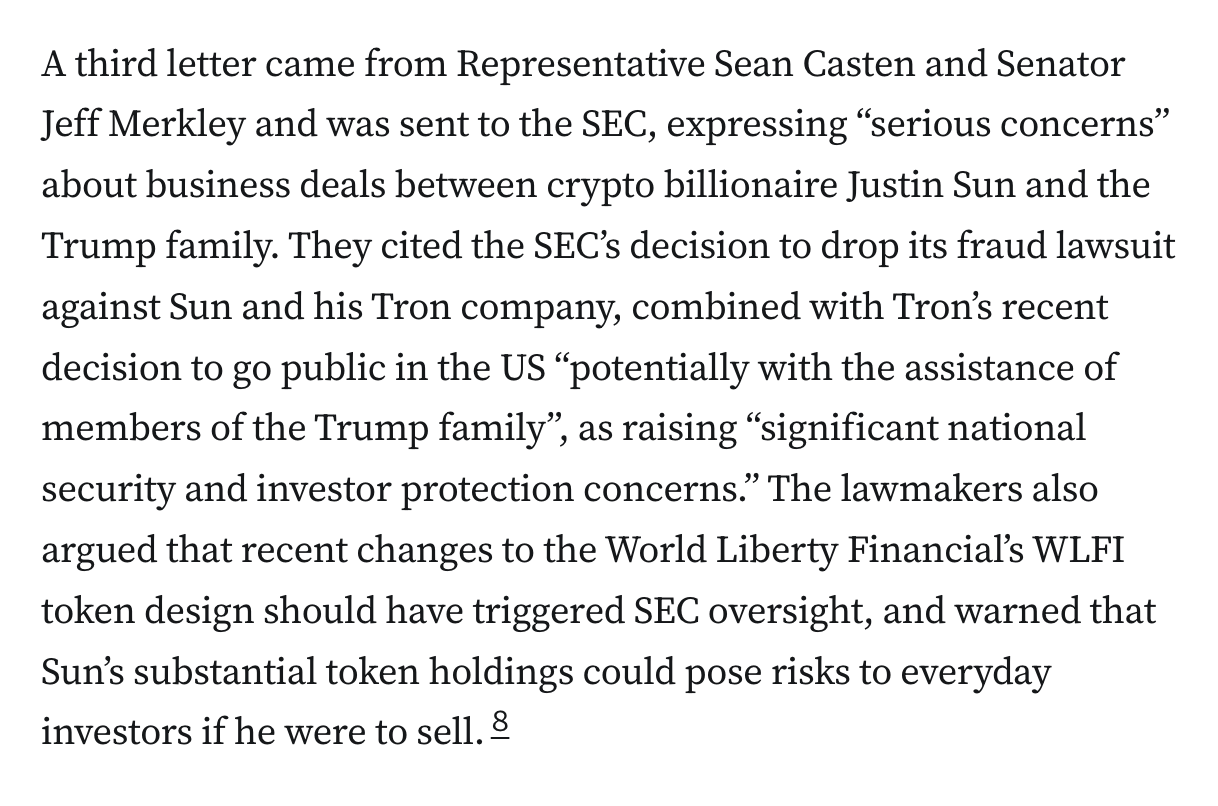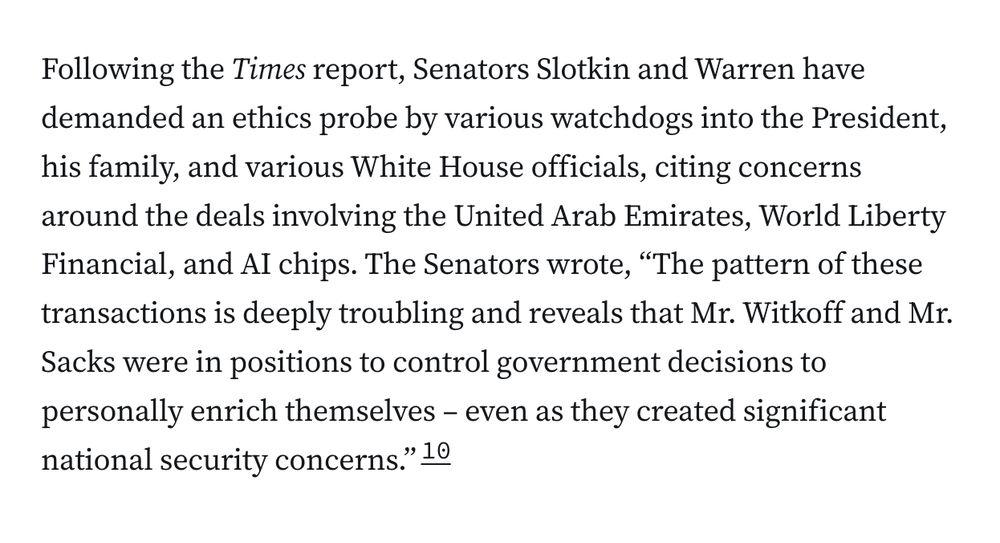This triggered a letter from two Democratic Senators, demanding an investigation into the deals, which they say "reveals that Mr. Witkoff and Mr. Sacks were in positions to control government decisions to personally enrich themselves – even as they created significant national security concerns."
Discussion
That's only one of the many letters coming out of Congress lately, demanding investigations into reports that Binance's monitorship may be ended early, "Crypto Czar" David Sacks overstaying his welcome, and the SEC's dropping of the fraud lawsuit against Justin Sun.

![Letters have been absolutely flying out of Congress. Following reports5 that Binance is nearing a deal with the Justice Department that would allow them to escape the oversight of a compliance monitor years ahead of schedule, Senator Elizabeth Warren and others sent another letter to Attorney General Pam Bondi requesting information about “the Trump Administration’s interactions with, and relationship to, Binance and its employees”. They criticized Bondi for a belated and partial response to a May letter inquiring about Binance’s compliance with its plea agreements, pardon discussions between Binance and DOJ officials, and business deals between Binance and the Trump family’s World Liberty Financial, writing that the DOJ had “fail[ed] to meaningfully answer any of our questions” [I44, 83, 91].6
Warren and seven other members of Congress have also sent a letter to White House Special Advisor for AI and Crypto, David Sacks, inquiring as to whether he has exceeded his 130-day limit as a Special Government Employee. They note that there are “more flexible ethics requirements” for SGEs because of the limited work period, and that Sacks enjoys that flexibility as he simultaneously serves as a General Partner at his Craft Ventures fund.7](https://media.hachyderm.io/media_attachments/files/115/267/212/856/794/461/original/5d71672a2d6e3302.jpg)
A new pro-crypto super PAC has emerged, promising to spend $100 million on pro-crypto candidates in the midterms. Between them and Fairshake, the pro-crypto PACs are on track to double their 2024 election spending in 2026.
Coinbase is now lobbying the Department of Justice to pressure Congress to prohibit states from enforcing regulations against crypto businesses after some states have stepped in to fill the federal regulatory void. They also want to stymie state-level laws "undermining" federal deregulation.
All that and more in this issue of Citation Needed, an independent publication entirely supported by readers like you. Consider signing up for a free or pay-what-you-want subscription!
Open Science
We are a network of scientists, developers and organizations building the next generation of digital spaces for open science.

![In elections and political influence
A new pro-crypto super PAC has added itself to a rapidly growing list. While 2024 was dominated by Fairshake and its Defend American Jobs and Protect Progress partisan arms, several new crypto PACs have emerged ahead of the midterms, apparently looking to split from Fairshake’s nominally unpartisan approach [I91]. The newest is called the Fellowship PAC, and it says it has more than “$100 million committed” for pro-crypto candidates — nearly as much as Fairshake spent in the 2024 election cycle. Though it has been somewhat tight-lipped on strategy, an announcement document signaled frustration with Fairshake, asserting that “Unlike past political efforts, the Fellowship PAC’s mission is defined by transparency and trust, ensuring political action directly supports the broader ecosystem rather than narrow or individual interests.”11 The PAC has not yet filed any reports beyond a statement of organization, and so its donors are not yet known.12
The Kraken crypto exchange has also ramped up its political spending, announcing a $1 million contribution each to the new Digital Freedom Fund PAC and America First Digital dark money group. Both are pro-crypto groups, and are explicitly Trump- and Republican-aligned.13](https://media.hachyderm.io/media_attachments/files/115/267/220/219/976/194/original/b568828b281c8f7b.png)
![After Coinbase was hit with a lawsuit from Oregon’s Attorney General, who argued that “states must fill [the] enforcement vacuum being left by federal regulators who are abandoning [crypto enforcement] cases under [the] Trump administration” [I82, 85], Coinbase has sent a letter to the Department of Justice asking them to pressure Congress to enact “broad” federal preemption provisions for cryptocurrency markets. They also argue the DOJ should lean on the SEC to issue rules excluding digital assets from securities laws. Besides the list of cases and cease-and-desist orders against Coinbase under state securities laws, they also protest state-level crypto licensing regimes (like New York’s BitLicense). They write, “In signing Illinois’s law just last month, Governor J.B. Pritzker made clear that the law aims squarely to undermine what he called the federal government’s efforts to ‘actively deregulat[e] the crypto industry.’” [I91] Heaven forbid any states should obstruct the deregulation that crypto spent so generously to secure!](https://media.hachyderm.io/media_attachments/files/115/267/223/896/471/163/original/3b779a738dbc4a72.png)
